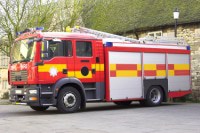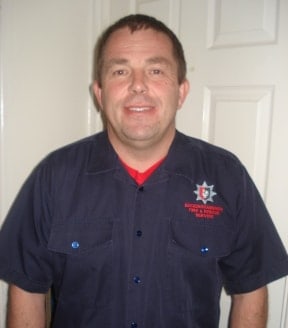Fire-fighters primarily work to put out fires, and to minimise the damage they cause. They are also extensively trained to rescue people and property from all manner of accidents and disasters. For instance, fire-fighters deal with things such as chemical spills, RTCs (Road Traffic Collisions) and terrorist attacks, and a large part of the job is also the promotion of measures to minimise the risk of fires occurring. Furthermore, fire-fighters work to enforce fire safety standards in commercial and public buildings, as well as educating the wider community about fire safety.
Fire-fighters are essential members of society, working to help people in need, assisting with accidents, floods and other emergencies. Battling fires and the associated dangers of fire is just one facet of the job, with the emphasis being more on preventing fires than merely putting them out when they do occur.
Though typically seen as a male-orientated occupation, there are increasing numbers of women becoming fire-fighters, and the fire brigade is committed to recruiting people regardless of gender, religion or ethnicity. Training is intensive and ongoing, as there is a large amount of equipment to learn to use effectively as well as certain procedures that have to be adhered to, to ensure safety. The training continues as new methods and equipment become available.
Of course, fire-fighting is not a completely risk-free occupation, as call-outs can mean dealing with dangerous situations, not just fire but dangerous chemicals and unstable properties, for instance. However, fire-fighters are highly-trained and work with excellent safety equipment, which serves to minimise these risks as much as possible.
Psychometric Testing
There are a series of firefighter aptitude tests a candidate must pass in order to become a firefighter. These tests are called the National Firefighter Written Tests, and include three tests measuring your verbal, numerical and situational judgement skills. Start practising for your firefighter aptitude test and ensure you pass on to the next level in the recruitment process.
Salary
Upon commencing training, the trainee fire-fighter earns £20,896 a year, and there are incremental rises on each level as the individual proves his or her competence. Fully-qualified, a fire-fighter can earn £27,851, with middle level officers such as a Watch or Station manager earning from £31-40,000. More managerial positions, such as a Group or Area Manager can expect earnings of £41-53,000 per annum. As the work is often unpredictable, there is paid overtime, which ranges from £14-27 an hour, depending on position and competency.
Responsibilities
As the nature of fire-fighting is often very changeable, describing a typical day is problematic. However, there are some duties that a fire-fighter, as part of his six-man crew, carries out regularly.
First and foremost, the fire-fighter is of course on-call, and at a moment’s notice must be ready to attend and assist at emergency incidents. Whilst at the station waiting for the call, fire-fighters typically inspect and maintain their appliance (the fire engine) and all equipment, so that it is certain to work effectively when it is called upon. Drills are undertaken to ensure the fire-fighter’s skills do not become stale and to keep physical fitness levels up, and training is done on new techniques and/or equipment to make sure everybody knows how to act or use a certain piece of equipment when in an emergency situation. Officer roles also call for extra duties, such as writing reports and completing any necessary paperwork.
Finally, as part of the initiative to raise fire safety awareness, fire-fighters often go into schools and other areas of the community to give talks to offer advice on minimising the risk of fires, as well as conducting inspections, grading the fire safety levels of buildings.
Qualifications
There are no actual educational prerequisites to becoming a fire-fighter. However, many brigades will expect a reasonable level of education and there are mental tests involving literacy and numeracy given as part of the application process that an applicant must pass to proceed.
The application process itself is rigorous, and involves both mental and physical assessment. You will be expected to hold a full manual driving licence and be a UK/EU citizen, and there are stringent medical and eyesight tests, including tests for colour blindness. Competition is extremely fierce, and in some areas there can be as many as 150 applications for one place.
Skills
Of course, fire-fighters must have a good level of physical fitness and stamina, but they also have to possess certain mental attributes too. A confident and resilient manner is a must, as the work is often pressurised and stressful. Good communication skills and the ability to work effectively within a team are also essential, as is adaptability, as each situation is different. A willingness to learn is desirable, as training is a constant progression throughout a fire-fighter’s career. Good situational awareness and problem solving skills plus the ability to “think on your feet”, are absolutely essential for giving orders in a stressful and dangerous environment. The ability to take and obey orders is also highly prized. As part of this, a high degree of self-discipline and the ability to remain cool and calm under pressure are both very important to this role.
Working Conditions
There are two types of fire-fighter, the full-time fire-fighter and the ‘retained’ fire-fighter. A retained fire-fighter has no full-time commitment, and is paid an annual retainer alongside fees for any training, drills or incidents he or she attends during the course of the year. A retained fire-fighter must be ready 24 hours a day, seven days a week, so a sympathetic employer is a must for this type of employment. Retained fire-fighters are often used in more rural areas, where maintaining full-time crews would not be viable, but they are also used to augment the number of fire-fighters available to urban stations too.
A full-time fire-fighter typically works a 42-hour week based around a shift system taking in both days and nights. Unsocial hours can be expected as part of this and overtime is paid should any work run over a fire-fighter’s regular hours.
Naturally, the conditions a fire-fighter works in outside the station can sometimes be deemed dangerous or unpleasant: extreme heat or cold, all weather conditions, sometimes in smoke-filled or tightly enclosed spaces. There is also the risk of explosions, collapsing buildings and fumes, but the safety training, equipment and procedures work to reduce these risks as much as possible.
Travel within the working day is a given. Overseas travel and being away from home overnight, apart from any night-duty on your shift rota, is extremely rare.
Experience
You do not need any certain type of experience to become a fire-fighter. If you pass the selection process, full training is provided through the training schools and further on-the-job training and assessment. As mentioned before, training is a constant throughout any fire-fighter’s career to enable them to keep up-to-speed with advancements in technique and equipment.
Employers
The main employers will be the local authority’s fire and rescue service, though there are opportunities through the British Airports Authority for becoming an airport fire-fighter. There are also opportunities in the RAF. Lastly, and though it is very rare, there are sometimes fire-fighting opportunities at large industrial companies.
Career Progression
All managers start their career as fire-fighters, so in theory anybody can move up the career ladder. An IPDS (Integrated Personal Development System) is being put in place across the fire service to enable fire-fighters to keep abreast of their professional development and work toward NVQ qualifications. Also, being involved in fire safety work enables you to take professional qualifications leading to becoming a member of the Institution of Fire Engineers. There is even scope to go on and study related subjects at degree level, such as fire safety management.
All promotions are on individual merit, and the process is usually internal up to Station Manager level. They are gained through demonstrating competence and ongoing potential for each role. The positions go from fire-fighter, to Crew Manager, Watch Manager and finally Station Manager. It is often necessary, though not compulsory, to move around brigades to attain promotion.
Image

Also known as…
- Fireman
- Fire Brigade
Related Jobs
- Paramedic
- Police Officer
- Prison Officer
- Nurse
What’s it really like?
Adrian Rhodes, 49 is a Watch Manager and has been fire-fghting for 31 years.
What did you do before you became a fire-fighter?
I was at school, studying for A-levels.
Can you describe a typical working day for yourself?
We check appliances, do drills and other training exercises and test our equipment and vehicles when in the station. Also, the brigade takes part in community education, and we go into schools to give talks, do home fire risk checks, and risk assessments of properties. Of course, at any time I can be called out to incidents such as fires, RTCs, flooding and building collapses, for instance.
What do you like and dislike about your job?
I like shift work, and especially the people I work with. The team-based ethic of the job means good relationships are often formed and the camaraderie is a nice part of the work. The variety of incidents means there is always something new, and the training means I am always learning. Like most people, I don’t particularly enjoy the paperwork, and I don’t like the quiet periods as they tend to drag, though these periods are often a good thing as it means incidents aren’t happening!
Do you have any advice for people who are considering becoming a fire-fighter?
Make sure you get super-fit, and do as much research as you can about the role and the application process to make sure you know everything you can about being a fire-fighter. Also, apply to lots of different brigades, and consider all duty systems. Study the entry requirements and make sure you “tick all the boxes”.
If you can, visit your local station, as they will often be a great help, and doing volunteer work out in the community often stands out on a CV and shows a commitment to helping the public. And once more, get fit!
Are you going on to any other jobs after your current role?
Yes, and they are still related to fire safety, such as circuit safety at racetracks. However, I am officially retiring soon, and may just move to Spain!









